『武士道 Bushido 』-新渡戸稲造(Inazo Nitobé)-
Chapter 15
(The Influence of Bushido 「大和魂」いかにして日本人の心となったか)
Bushido, the Soul of Japan by Inazo Nitobe
[Book]
[reading]
・Chapter TOP 新渡戸稲造(Inazo Nitobé)TOP
・Chapter 00(Prefaces 序文)
・Chapter 01(Bushido as an Ethical System 武士道とは)
・Chapter 02(Sources of Bushido 武士道の源)
・Chapter 03(Rectitude or Justice 「義」)
・Chapter 04(Courage, the Spirit of Daring and Bearing 「勇」)
・Chapter 05(Benevolence, the Feeling of Distress 「仁」)
・Chapter 06(Politeness 「礼」)
・Chapter 07(Veracity or Truthfulness 「誠」)
・Chapter 08(Honor 「名誉」)
・Chapter 09(The Duty of Loyalty 「忠義」)
・Chapter 10(Education and Training of a Samurai 武士は何を学びどう己を磨いたか)
・Chapter 11(Self-Control 人に勝ち己に勝つために)
・Chapter 12(The Institutions of Suicide and Redress 「切腹」)
・Chapter 13(The Sword, the Soul of the Samurai 「刀」)
・Chapter 14(The Training and Position of Woman 武士道が求めた女性の理想像)
・Chapter 15(The Influence of Bushido 「大和魂」)
・Chapter 16(Is Bushido Still Alive? 武士道は蘇るか)
・Chapter 17(The Future of Bushido 武士道から何を学ぶか)
・[修養]、
・[自警録]
on the nation at large.
We have brought into view only a few of the more prominent peaks which rise above the range of knightly virtues, in themselves so much more elevated than the general level of our national life. As the sun in its rising first tips the highest peaks with russet hue, and then gradually casts its rays on the valley below, so the ethical system which first enlightened the military order drew in course of time followers from amongst the masses. Democracy raises up a natural prince for its leader, and aristocracy infuses a princely spirit among the people. Virtues are no less contagious than vices. "There needs but one wise man in a company, and all are wise, so rapid is the contagion," says Emerson. No social class or caste can resist the diffusive power of moral influence.
Prate as we may of the triumphant march of Anglo-Saxon liberty, rarely has it received impetus from the masses. Was it not rather the work of the squires and gentlemen? Very truly does M. Taine say, "These three syllables, as used across the channel, summarize the history of English society." Democracy may make self-confident retorts to such a statement and fling back the question—"When Adam delved and Eve span, where then was the gentleman?" All the more pity that a gentleman was not present in Eden! The first parents missed him sorely and paid a high price for his absence. Had he been there, not only would the garden have been more tastefully dressed, but they would have learned without painful experience that disobedience to Jehovah was disloyalty and dishonor, treason and rebellion.
What Japan was she owed to the samurai. They were not only the flower of the nation but its root as well. All the gracious gifts of Heaven flowed through them. Though they kept themselves socially aloof from the populace, they set a moral standard for them and guided them by their example. I admit Bushido had its esoteric and exoteric teachings; these were eudemonistic, looking after the welfare and happiness of the commonalty, while those were aretaic, emphasizing the practice of virtues for their own sake.
In the most chivalrous days of Europe, Knights formed numerically but a small fraction of the population, but, as Emerson says—"In English Literature half the drama and all the novels, from Sir Philip Sidney to Sir Walter Scott, paint this figure (gentleman)." Write in place of Sidney and Scott, Chikamatsu and Bakin, and you have in a nutshell the main features of the literary history of Japan.
The innumerable avenues of popular amusement and instruction—the theatres, the story-teller's booths, the preacher's dais, the musical recitations, the novels—have taken for their chief theme the stories of the samurai. The peasants round the open fire in their huts never tire of repeating the achievements of Yoshitsuné and his faithful retainer Benkei, or of the two brave Soga brothers; the dusky urchins listen with gaping mouths until the last stick burns out and the fire dies in its embers, still leaving their hearts aglow with the tale that is told. The clerks and the shop-boys, after their day's work is over and the amado of the store are closed, gather together to relate the story of Nobunaga and Hidéyoshi far into the night, until slumber overtakes their weary eyes and transports them from the drudgery of the counter to the exploits of the field. The very babe just beginning to toddle is taught to lisp the adventures of Momotaro, the daring conqueror of ogre-land. Even girls are so imbued with the love of knightly deeds and virtues that, like Desdemona, they would seriously incline to devour with greedy ear the romance of the samurai.
Outside shutters.
The samurai grew to be the beau ideal of the whole race. "As among flowers the cherry is queen, so among men the samurai is lord," so sang the populace. Debarred from commercial pursuits, the military class itself did not aid commerce; but there was no channel of human activity, no avenue of thought, which did not receive in some measure an impetus from Bushido. Intellectual and moral Japan was directly or indirectly the work of Knighthood.
Mr. Mallock, in his exceedingly suggestive book, "Aristocracy and Evolution," has eloquently told us that "social evolution, in so far as it is other than biological, may be defined as the unintended result of the intentions of great men;" further, that historical progress is produced by a struggle "not among the community generally, to live, but a struggle amongst a small section of the community to lead, to direct, to employ, the majority in the best way." Whatever may be said about the soundness of his argument, these statements are amply verified in the part played by bushi in the social progress, as far as it went, of our Empire.
How the spirit of Bushido permeated all social classes is also shown in the development of a certain order of men, known as otoko-daté, the natural leaders of democracy. Staunch fellows were they, every inch of them strong with the strength of massive manhood. At once the spokesmen and the guardians of popular rights, they had each a following of hundreds and thousands of souls who proffered in the same fashion that samurai did to daimio, the willing service of "limb and life, of body, chattels and earthly honor." Backed by a vast multitude of rash and impetuous working-men, those born "bosses" formed a formidable check to the rampancy of the two-sworded order.
In manifold ways has Bushido filtered down from the social class where it originated, and acted as leaven among the masses, furnishing a moral standard for the whole people. The Precepts of Knighthood, begun at first as the glory of the elite, became in time an aspiration and inspiration to the nation at large; and though the populace could not attain the moral height of those loftier souls, yet Yamato Damashii, the Soul of Japan, ultimately came to express the Volksgeist of the Island Realm. If religion is no more than "Morality touched by emotion," as Matthew Arnold defines it, few ethical systems are better entitled to the rank of religion than Bushido. Motoori has put the mute utterance of the nation into words when he sings:—
"Isles of blest Japan!
Should your Yamato spirit
Strangers seek to scan,
Say—scenting morn's sun-lit air,
Blows the cherry wild and fair!"
Yes, the sakura has for ages been the favorite of our people and the emblem of our character. Mark particularly the terms of definition which the poet uses, the words the wild cherry flower scenting the morning sun.
Cerasus pseudo-cerasus, Lindley.
The Yamato spirit is not a tame, tender plant, but a wild—in the sense of natural—growth; it is indigenous to the soil; its accidental qualities it may share with the flowers of other lands, but in its essence it remains the original, spontaneous outgrowth of our clime. But its nativity is not its sole claim to our affection. The refinement and grace of its beauty appeal to our aesthetic sense as no other flower can. We cannot share the admiration of the Europeans for their roses, which lack the simplicity of our flower. Then, too, the thorns that are hidden beneath the sweetness of the rose, the tenacity with which she clings to life, as though loth or afraid to die rather than drop untimely, preferring to rot on her stem; her showy colors and heavy odors—all these are traits so unlike our flower, which carries no dagger or poison under its beauty, which is ever ready to depart life at the call of nature, whose colors are never gorgeous, and whose light fragrance never palls. Beauty of color and of form is limited in its showing; it is a fixed quality of existence, whereas fragrance is volatile, ethereal as the breathing of life. So in all religious ceremonies frankincense and myrrh play a prominent part. There is something spirituelle in redolence. When the delicious perfume of the sakura quickens the morning air, as the sun in its course rises to illumine first the isles of the Far East, few sensations are more serenely exhilarating than to inhale, as it were, the very breath of beauteous day.
When the Creator himself is pictured as making new resolutions in his heart upon smelling a sweet savor (Gen. VIII, 21), is it any wonder that the sweet-smelling season of the cherry blossom should call forth the whole nation from their little habitations? Blame them not, if for a time their limbs forget their toil and moil and their hearts their pangs and sorrows. Their brief pleasure ended, they return to their daily tasks with new strength and new resolutions. Thus in ways more than one is the sakura the flower of the nation.
Is, then, this flower, so sweet and evanescent, blown whithersoever the wind listeth, and, shedding a puff of perfume, ready to vanish forever, is this flower the type of the Yamato spirit? Is the Soul of Japan so frailly mortal?
Read文献、
book文献
TOP
日本の魂ー日本思想の解明ー
日本的思考の根源を見る。
”忠義”は追従ではない。”名誉”は求める心である。
(第三章 義-あるいは正義について)
サムライにとって、 卑怯な行動や不正な行動ほど恥ずべきものはない。
(第九章 忠義)
武士道は、われわれの良心を主君の奴隷となすべきことを要求しなかった
(第十章 武士の教育)
武士道は経済とは正反対のものである。それは貧しさを誇る。
(第十一章 克己)
心の奥底の思いや感情—特に宗教的なもの—を雄弁に述べ立てることは、日本人の間では、それは深遠でもなく、 誠実でもないことの疑いないしるしだと受け取られた。
(第十四章 女性の教育と地位)
妻がその夫、家庭そして家族のために身を捨てることは、男が主君と国のために身を捨てるのと同様、自発的かつみごとになされた。
|
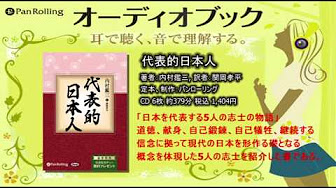
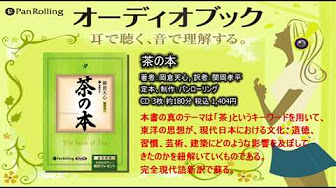
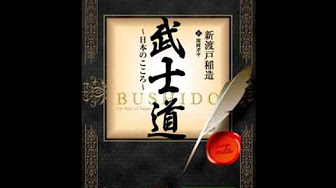


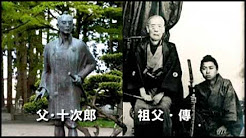

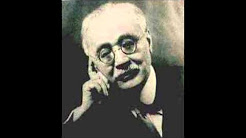



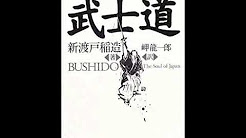
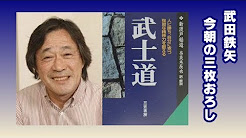
・新渡戸稲造
第1弾「世界を結ぶ『志』~新渡戸稲造の生涯~」、
第2弾「未来につながる『道』~新渡戸稲造の武士道~」、
第3弾「すべてに根ざす『愛』~新渡戸稲造の苦悩~」、
・ 新渡戸稲造の至極の名言集
・「新渡戸稲造の名言」20話
| |
・Bushido: The Soul of Japan by Inazo Nito(1-18)
・Bushido: The Soul of Japan by Inazo Nitobe(1-18)
・武士道「BUSHIDO」Japanese Ver.
・≪AI朗読≫武士道
・【武田鉄矢】『武士道』完全版
|
Bushido, the Soul of Japan
『武士道は定式化されたものではないが、昔もそして今も、日本人を鼓舞し、わが国を動かす原動力なのである』
日本人が日本人たりえる所以。
国家としての歴史的哲学体系を持たない日本の、現代社会においても尚、我々の血肉となり、在り続ける道徳律の根幹は「武士道」にあり。
日本人 新渡戸稲造博士が世界に発信した日本人論。
世代と国境を越え今なお読み継がれている世界的ベストセラー。
西洋・東洋の文化・哲学・思想と照らし合わせながら、その特異性と唯一無二の行動規範・心の拠り所を詳細に解説した普遍の書が、完全現代語訳、プロフェッショナルのナレーションで今蘇る。
21世紀。世界第三位の経済大国であるわが国日本。
政治的にも文化的にもより身近に世界と対峙する現代においてこそ、われわれの心の中に脈々と流れ続ける、日本人が日本人足らしめる「武士道」の精神を紐解く時なのではないだろうか。
本書は1世紀の時を超えた今も尚色褪せること無く、むしろその博識と見解、交える事例とそのユーモアに溢れた表現により現代人の我々にも実に痛快に日本の心「武士道」を理解させてくれる。
「武士道」がいつどのようにして始まったのか、それはどんな特徴を持ち、どのようなことを教えようとしているのか、武士以外の一般民衆にどのような影響を与えたのか、その影響がどれほど永く続いているか。
様々な角度・キーワードで武士の心得、さむらいの心の在り方をリレー形式で綴っている。
世界有数の犯罪率の低さ、大災害時での規律、自発的な他助の精神と行動は時代を超えて、親から子へと語り継がれてきた「道徳律」が存在し続けていることを如実に表している。
知っているようで知らない「日本の心」が、ここに明かされている。
内容抜粋
「今何とおっしゃいましたか?」と敬愛する教授は尋ねた。
「日本の学校には宗教の教育がないということでしょうか?」
そうですと答えると、教授は驚いて足を止めた。そして、今でも耳から離れない声音で、重ねてこう聞いた。
「宗教がない! だとしたら、いったいどうやって道徳を教えるんですか?」
この質問に私は意表を突かれ、とっさに答えを返すことができなかった。というのも、子どもの頃私が学んだ道徳というのは、学校で教わったものではなかったからである。私は、自分の持っている善悪正邪の概念を作り上げているさまざまな要素をひとつひとつ分析してみて、ようやく、それらを私の中に植えつけたのは「武士道」であったことに気づいた。
武士道とは、武士が守るよう求められる、もしくは、そう教えられる道徳的な作法である。文字に書かれたものはなく、せいぜい口伝えで伝えられた格言や、有名な武士や学者が書いたものが残されている程度である。
多くの場合そうしたものさえなく、しかしだからこそかえって深く心に刻まれ、守るべき掟<<おきて>>として強い拘束力を持っていた。ひとりの優秀な頭脳が考え出したものでもなければ、ひとりの高名な人物の生きかたが手本となってできたものでもない。数十年、数百年に及ぶ武士の歴史の中で自然に醸成されたものである。
「義は、道理に従ってためらうことなく、何をなすべきかを決断する力である。死ぬべきときは死を選び、討つべきときには討つことを選ぶ力である」
「戦いの真っただ中に飛び込んで討ち死にするのはいともたやすいことで、身分の卑しい者にもできる。生きるべきときは生き、死ぬべきときにのみ死ぬのが本当の勇気である」
「義に過ぎれば固くなる。仁に過ぎれば弱くなる」
「礼法の要点は精神を養うことにある。礼をもって静かに座っていれば、どんな乱暴者でも危害を加える気になれないほどに」
仁愛や謙譲の精神から生まれた礼儀は、他人に対する思いやりから生まれて、人への同情心を品よく優雅に表現するものだからである。
「心だに誠の道にかないなば祈らずとても神や守らん」
「忠ならんと欲すれば孝ならず、孝ならんと欲すれば忠ならず」
命は主君に仕えるための手段だと考えらえており、その理想形は、名誉のために命を捨てることであった。
「おのれの魂という畑が、優しい心で揺れ動くのを感ずるか? まかれた種が芽吹こうとしているのだ。言葉でそれを妨げてはならぬ。静かに、ひそやかに、自ら芽吹くのを見守っているのだ」
「死を軽<<かろ>>んずることは勇気のいる行為である。しかし、生きることが死よりもつらいときに、あえて生きることこそが本物の勇気である」
「かくすればかくなるものと知りながら やむにやまれぬ大和魂」
目次
訳者序文
初版への序文
改訂第10版への序文
新渡戸博士の『武士道』に寄せて
第1章 道徳体系としての「武士道」
第2章 武士道の源
第3章 「義」――あるいは正義について
第4章 「勇」――勇敢さと忍耐力
第5章 「仁」――慈愛の心
第6章 「礼」
第7章 「誠」――正直さと誠実さ
第8章 「誉<<ほまれ>>」――あるいは名誉について
第9章 「忠義」
第10章 武士の教育と鍛錬
第11章 自制心
第12章 切腹と敵討ちという制度
第13章 刀――武士の魂
第14章 女性の教育と地位
第15章 武士道から大和魂へ
第16章 武士道は今も生きているか
第17章 武士道のこれから
新渡戸稲造(Inazo Nitobe)
文久2年(1862年)、藩士 新渡戸十次郎の三男として南部藩(今の岩手県)に生まれる。
幼少期より東京英語学校に学び、少年期は、後に「代表的日本人」の著者でもある内村鑑三らとともに札幌農学校へ入学し学業を磨いた。
明治維新後はアメリカ・ドイツに渡り農政学を始め様々な研究に従事。
台湾総督府技師として台湾の殖産に携わり功績を挙げる。
国際連盟事務次長としても国際的に活躍。帰国後は様々な学校の教職を歴任した後、東京女子大学初代学長にもなる。
本書「武士道」は英語のみならずポーランド、ドイツ、ノルウェー、スペイン、ロシア、イタリアなど、主として欧米の多様な国の言語に翻訳され世界的ベストセラーとなる。旧五千円札の肖像画の人物としても有名。
TOP

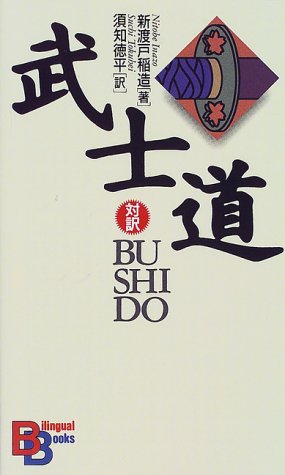
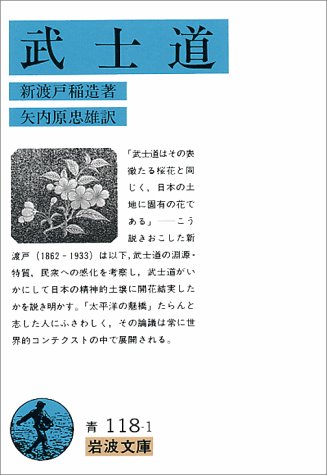
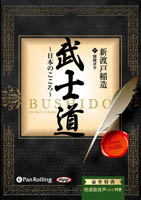 朗読,Read 朗読,Read
|
















 朗読,Read
朗読,Read
















 朗読,Read
朗読,Read